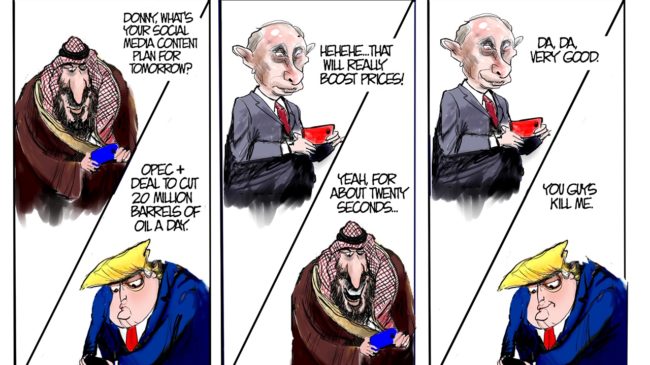The age of managed oil markets is dead. If that wasn’t apparent before now, Mexico’s decision to unfurl the black flag when asked to contribute to reducing global oil production by 10 percent and risk scuttling the shaky détente between Saudi Arabia and Russia was the final nail in the coffin.
First Russia, then Mexico.
Russian President Vladimir Putin sparked the current price war with Saudi Arabia and other members of the Organization of Petroleum Exporting Countries (OPEC) more than a month ago with a nyet to further limits on Russian output. In a snit over Russia’s snub, Saudi Crown Prince Mohammed bin Salman (MBS) opened the taps and increased global production by 20 percent almost overnight.
Oil prices plummeted in response, decimating national budgets and compounding the economic pain caused by the global response to the coronavirus pandemic.
With the world’s biggest economies against the ropes, Putin and MBS agreed to put down their drill-bits and play nice, which is when Mexico’s President Andres Manuel Lopez Obrador decided to cause trouble.
To a market managed by this lot, good riddance.
Even though the Saudi-led OPEC and Russia eventually struck a bargain late Sunday to reduce production by 9.7 million barrels a day, Mexico’s ability to turn global oil markets into a telenovela—with an equally unbelievable resolution—begs the question, why does the world put so much power in the hands of a cartel?
Every oil-producing country involved in the unprecedented negotiations attempted to get a leg up on the competition. Mexico was even able to extract a promise from President Trump to cover most of its portion of the cuts so that it could carry on with plans to rebuild its oil and refining sectors.
It is time to accept that collective international action will not overcome the national self-interest of individual politicians and that attempts to intervene in the market are doomed to deliver bad results. The answer to countering this type of national self-interest is simple—let the market work.
The market is far more efficient at solving the problem of supply and demand than governments—the ongoing international circus of tweets and virtual meetings influencing markets is all the evidence needed to end the debate about that.
The problem is that markets can be brutal and they don’t play favorites.
Left alone, the market will reward the lowest-cost producer and punish producers with higher breakeven costs. Those forces could lead to more failed companies and job losses in the U.S. oil sector, and in other places with robust private energy sectors (Canada, looking at you), but those jobs are being destroyed now by the decisions of a tiny group of authoritarian leaders.
Do we really want to continue to leave our economic and national security vulnerable to the whims of Putin or Saudi Crown Prince Mohammed bin Salman or Mexico?
The traditional argument in favor of active management is that wild fluctuations in the price of oil have global implications because of its universal importance to defense and heavy industry. In that case, we either need to find better management or diversify our energy supply.
On a global free market, national oil companies that benefit from generous state support could have an unfair advantage over private companies—if they are well managed. The oil world is littered with examples to the contrary. If Mexico wants to keep pumping out 1.6 million barrels of oil and building refineries instead of buying lower-cost gasoline from its northern neighbor, best of luck to it.
The United States is one of the few countries without a national oil company, so a free market for oil will require adequate protections against states that subsidize domestic production and then export it. But every market requires clear rules and strict enforcement mechanisms to ensure a level playing field.
Supply is not the immediate challenge, though. Removing 10 million or 15 million barrels a day from global markets will at best establish a floor below which prices won’t fall further. That price, though, may still be too low for a great number of U.S. oil companies to continue to produce, especially small and mid-sized independents that have traditionally been at the forefront of new discoveries.
A global agreement on production levels will result in a price that works for Russia and Saudi Arabia—and in the economic strangulation of those U.S. companies. Better to live and die on the free market where a company can decide its own fate.
Restore demand and the market will right itself. Prices will eventually rise as excess oil is drained off, making room for new competitors to enter the market. Real competition will encourage innovation and efficiency, hallmarks of U.S. producers.
In the meantime, global leaders should stop squabbling over who gets the biggest slice of the oil market and focus on developing a vaccine to the COVID-19 virus so we can lift the global quarantine and get back to work.
Restart economic activity and demand for oil, along with demand for everything else, will likely follow. Massive infrastructure projects require lots of labor and fuel, so governments could prioritize planned maintenance and expansion projects as well. Modernizing transportation, energy, and communication infrastructure would help work off the build-up of crude in storage and the growing spare tire many of us have acquired after a month of watching Netflix’s “Tiger King” from our couches. And when the bill comes due, hopefully, we’ll have far fewer potholes and crumbling bridges to contend with.
